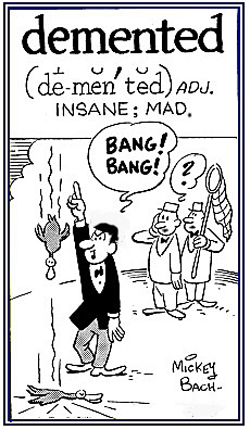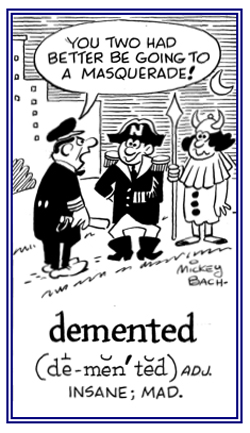menti-, ment-
(Latin: mens, mentalis; mind, intellectual faculties; mental; memory)
2. Etymology: although the origin of the concept of dementia goes as far back as the ancient Greek and Roman philosophers and physicians; it was in 1901 when Alois Alzheimer (1864-1915), a German neurologist, identified the first case of what became known as Alzheimer's disease which currently describes individuals of all ages with a characteristic common symptom pattern, disease course, and neuropathology.
Delusions and hallucinations may occur. The most common degenerative brain disorder, Alzheimer disease makes up 70% of all cases of dementia. Onset is usually in late middle life, and death typically takes place in five to ten years.
Synonyms: Alzheimer dementia, presenile dementia; dementia presenilis, primary senile dementia, primary neuronal degeneration.
Alzheimer disease ranks fourth as a cause of death in the U.S., and its annual cost to the nation is nearly $100 billion.
Onset is typically insidious, with a progressive deterioration in the ability to learn and retain information. In recalling and repeating new material, the patient makes intrusion errors (insertion of irrelevant words or ideas) and resorts to confabulation (fabrication of stories in response to questions about situations or events that are not recalled).
Orientation and judgment decline; 50% of patients experience depression, 20% delusions. Agitation occurs in 70%. Numerous drugs, including many not considered psychoactive, can aggravate the symptoms of Alzheimer disease; clinical depression can mask dementia, and vice versa.
Neurologic findings may be essentially normal, but myoclonus (condition of abnormal contraction of muscles or portions of muscles), bradykinesia (slow movements), rigidity, and seizures can occur late in the disease. Death is usually due to sepsis (blood stream infection or blood poisoning) associated with urinary or pulmonary infection.
2. In law, competent to go to trial.
3. If someone is compos mentis, he/she is able to think clearly and is responsible for her/his actions: "My sister was quite old, when I last saw her, but she was definitely compos mentis."
2. A rarely used term for dementia.
Impairment of memory is an early sign of dementing; total recovery is thought to be impossible since organic cerebral disease is involved.
When dementing is going on, it is also existing as "adolescent insanity" or "schizophrenia".
2. Etymology: from Latin dement, literally, "losing one's mind".2. Pertaining to not being mentally well and not able to comprehend what is real or not able to think clearly: There were several of the elderly demented people in the nursing home who could not even recognize members of their own families when they came to visit.


Go to this Word A Day Revisited Index
for a list of additional Mickey Bach illustrations.
2. Relating to being unable to think or act clearly when someone is extremely worried, angry, or excited by something.
2. An acquired organic mental disorder with loss of intellectual abilities of sufficient severity to interfere with social or occupational functioning: Dementia is a dysfunction which is multifaceted and involves memory, behavior, personality, judgment, attention, spatial relations, language, abstract thoughts, and other functions.
The intellectual decline of dementia is usually progressive and it initially does not interfere with the level of consciousness.
3. A condition seen in boxers (and alcoholics), caused by repeated cerebral concussions and characterized by weakness in the lower limbs, unsteadiness of gait, slowness of muscular movements, hand tremors, hesitancy of speech, and mental dullness: The condition of dementia pugilistica develops over a period of years, with the average time of onset being about sixteen years after the start of a career in boxing.
Another reason someone might have dementophobia is because he or she has severe depressions, headaches, dizziness, or difficulty breathing.
Another version, "Mind animates matter." From the writings of Virgil; motto of the (Universitas Oregonensis) University of Oregon, Eugene, Oregon, USA; as well as, Rossall School, U.K.
A motto of North Carolina Agricultural and Technical State University, Greensboro, North Carolina, USA; and the Massachusetts Institute of Technology (MIT), USA.
2. "A healthy mind in a healthy body."
Actually, the whole sentence is Orandum est ut sit mens sana in corpore sano.: "You should pray for a healthy mind in a healthy body."
Juvenal, in his Satires, suggests to us that we must pray for attainment of mens sana in corpore sano, and his phrase has found use for many centuries as the stated educational goal of many schools: "To train the body as well as the mind."
Public statements by some near-illiterate college athletes suggest that the sound body is too often achieved without accompanying improvement of the mind.

